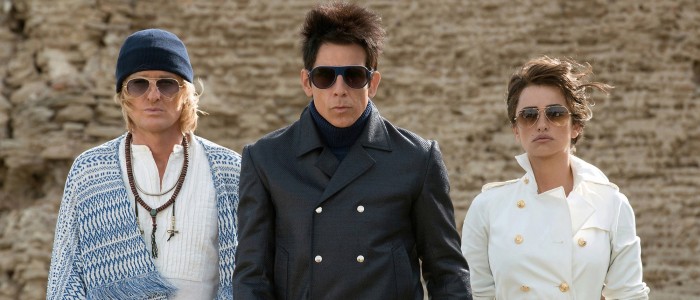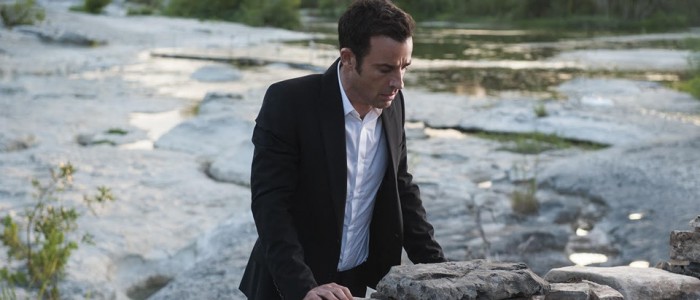Interview: Justin Theroux Wanted A Good Reason To Make 'Zoolander 2'
Justin Theroux was originally going to direct Zoolander 2. The co-writer and co-star of the sequel was attached to the director's chair for a while, but due to scheduling conflicts with HBO's The Leftovers, he had to step down. But the actor remained very much involved in the project, as he worked on the script for years, visited the set, and, of course, reprised his role as the infamous Evil DJ.
Below, read our Justin Theroux interview.
Theroux co-wrote Zoolander 2 with Ben Stiller, Nicholas Stoller, and John Hamburg. Stiller and the actor/writer have collaborated in the past, as the pair worked on the script for Tropic Thunder together. With this sequel, they return to male model idiots Derek Zoolander (Stiller) and Hansel (Owen Wilson).
Here's what Justin Theroux had to say about working on the film, how the project evolved over the years, The Leftovers, and more:
The film goes to some unexpected places. When it comes to the third act reveal, was that always envisioned from the start?
We had a long period of gestation for writing this script, so we had a lot of time to marinate on it. I don't think any of us had a set idea of "here's what the movie has to do." We struck the idea early of this Da Vinci Code-esque riddle in Europe [laughs], and Derek and Hansel having to figure it out was one of the ideas that just made us laugh: two of the stupidest men having to figure out an overly complicated plot.
Sometimes the plot is what points you in the direction of where you're supposed to go, and the characters do that as well. We just kind of went for it. [Laughs.] If you boil the first movie down, it's the wacky retelling of The Manchurian Candidate. You have the assassination plot and the brainwashing. Here, it's these two guys, pop stars, the fountain of youth and... it made us laugh.
You have been working on Zoolander 2 for a while now. Were there ever any significant story changes?
It evolved a lot. We wanted there to be a good reason to make a sequel, not just to because of, "Oh yeah, people want a sequel. Let's just give them what they want." We wanted to really have something good to hang on it, and also create new characters to speak to the time they haven't been in fashion. We got to write Kristen Wiig's character, create Kyle Mooney's Don Atari character, representing the moronic, hipster, absurd type. Lots of things changed while we were writing, and for the better. We always try to beat our jokes.
How much research did you and your co-writers do? Do you really dive deep into the world of fashion?
It's like anecdotal research. There are lots of dribs and drabs of pop culture references, from tattooing to social media to Kyle's character. It's not research in the traditional sense, like, "What would they be wearing?" It's more of, "What are they wearing? Can they wear more of it at the same time?" We want to go over-the-top without exploding it. It's more this kind of ear to the ground research, as opposed to studied research.
 Derek and Hansel aren't the brightest guys. When they say something absurd or crass, it's usually not mean-spirited, because they just don't know any better. Is that a fine line to walk, though?
Derek and Hansel aren't the brightest guys. When they say something absurd or crass, it's usually not mean-spirited, because they just don't know any better. Is that a fine line to walk, though?
I don't think that's so much as Derek and Hansel, although they're great vehicles for that, but more a question of: what's good satire? If you're satirizing something, you're hitting at something that's real and true, and putting it on its head, and we did that with Tropic Thunder. For example, we did a big swing with Robert Downey Jr.'s character. We thought people could get offended, for sure, but at the same time, the joke was aimed squarely at narcissistic actors that take themselves too seriously.
The same goes for Zoolander, so if anybody is offended by anything, it's really... If you look at the structure of a joke, it's not the Benedict Cumberbatch character or transgender or binary people — it's on the two middle-aged, out-of-touch male models with the IQ of celery. Like, that's the butt of the joke. I was a little shocked when that criticism came out, especially prior to the movie's release.
Context matters.
Context matters completely, yeah. Now that people have seen the movie, you can tell the character is actually a strong character — the biggest model in the fashion industry. The model literally ends up whipping Derek and Hansel with whips. [Laughs.]
[Laughs.] Audience expectations are tough with comedies, because people have an idea of what they want from Zoolander 2. How much do you have to consider those expectations?
Of course I think you have to consider it; it's always in the back of your brain. Really, we're fans of the movie, too, so we're trying to write something we're going to enjoy just as much. Ben is literally Derek Zoolander, so you got him shepherding it and directing it. We're all aware of it, but obviously we don't want to do a reboot of the gas station or paint the same painting twice. We want to take chances and do other stuff.
Are there any scenes or ideas you miss that didn't make the final cut?
It's funny, Nick Stoller and I were just talking about that, trying to remember anything. I'm sure there are things that were scripted, but most of the stuff in the process of writing it... the funniest stuff usually ends up on top. The funniest joke typically stays, while the other stuff falls away.
Ben is very good at shooting alternate jokes in scenes, and some that are a little more R-rated or some that are more PG. Every scene probably has its series of alternate jokes in it. Inevitably, there's going to be a three-hour director's cut at some point, where we cram all the jokes in. [Laughs.] That would probably be trying or tiring on people's patience, I'm sure.
You know, you want to get in and get out, with all your best material. Everything we wanted in there is in there. It's hard to think of one thing, but there were definitely some scenes we wrote we didn't shoot, because they didn't work in the context of the movie.
At what point in your career did you start writing?
I was an actor first, but I credit Ben for giving me a writing career, because he was the first person to really read my writing, understand it, and encourage it. I was a fan of Ben's right after he did The Ben Stiller Show, which was right around when I met him. They cancelled it after 13 episodes, but I was a huge fan of that brand of comedy and what he was doing, so we clicked on that. When he read some of my writing, he gave me a shot.
Do you write every day?
No. I find that if I'm working as an actor on something, it's too hard to do both, because the hours are too long. I'm thinking about things I might be doing, so I'll keep notes or something. Usually when I wrap I like to write.
Were you on the set of Zoolander 2? Were any rewrites needed during the shoot?
Yeah, that's the way Ben likes to work. I was shooting a television show while they were shooting Zoolander 2 in Rome, but I was going back and forth between the two, trying to be on set as much as possible. On Tropic Thunder, I was there every single day, whereas on Zoolander I was jetting in and jetting out for a week or two at a time.
 You mentioned working on a TV show, The Leftovers. I think season two is excellent.
You mentioned working on a TV show, The Leftovers. I think season two is excellent.
Thank you.
The conversations it would start every week were great. It felt like people really came around on the show this past season.
I think it's one of those cases of once you release yourself into the nuances of the show or the mystery of the show... I think during the first season everyone was asking, "What does it all mean?" That's kind of the point of the show, and once that clicks for you... I was a fan of the first season, too. I really liked it. I think something happened with season two where the concept became more identifiable. Really, I credit Damon [Lindelof] and Tom [Perrotta], because not many shows take a hard run at the meaning of life, and those guys did. He's kind of a master at weaving these elaborate tapestries and, somehow, evoking these reactions, whether they're good or bad.
Kevin Garvey singing "Homeward Bound" evokes all sorts of reactions.
It hit you in a real uncomfortable place. A lot of scenes do, but that one in particular. They hit these pressure points. I remember I'd watch it and be just so moved by what Damon was going at. That whole storyline with Patti... when I was reading that particular script I was blown away. How do humanize an undeniable villain in 60 pages? You also cry for her. It's impressive.
It must be comforting knowing the end of the show is coming, and not just because you're not on the same program for years, but that it'll be ending on its own terms.
Damon was really upfront early on. Nobody likes to sign a five or six-year contract, but he was very clear from the get-go that this is not a show that lives for five or six years, that it would be best at three or four. I think actors in general don't like being tied up for that long. I like to know that there's going to be a period or punctuation on something — and to know when that'll be. I like knowing there's an end to the story. I can't imagine something worse than scripts being written into a tunnel, thinking, "I don't know when this ends. I don't know." It usually ends when people get sick of it, but I think it's great when it gets to end on its own terms.
You haven't directed a feature since Dedication. Do you plan on directing again soon?
Yeah, I do. I was going to direct Zoolander 2, but I did a television show [laughs], so I took myself out of the running. Yeah, that's another reason I'm looking forward to the ending of the show, because then that means I could direct something.
***
Zoolander 2 opens in theaters February 12th.
